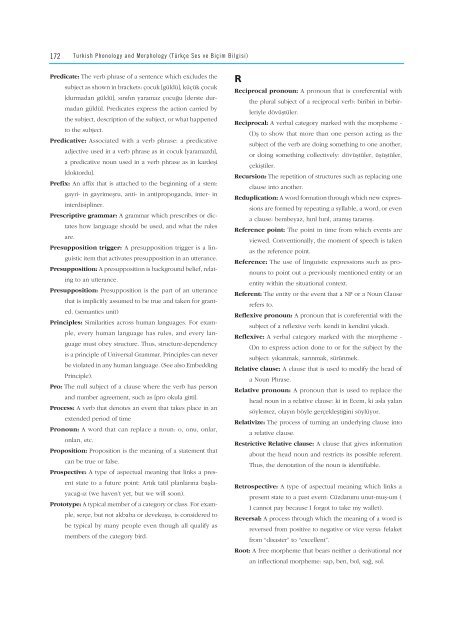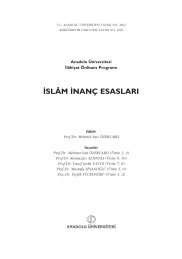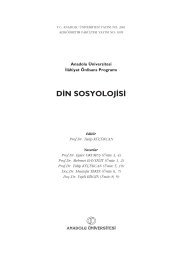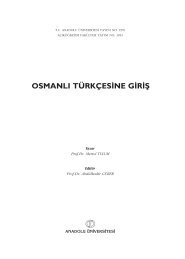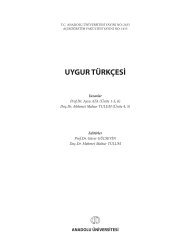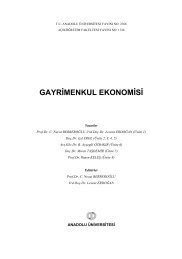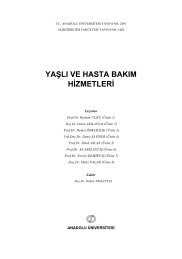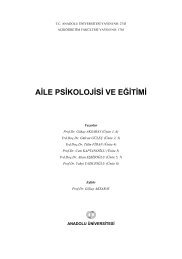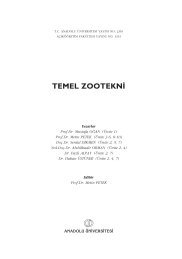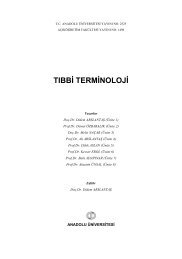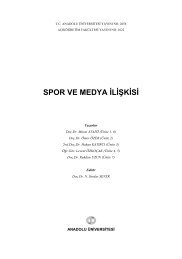turkish phonology and morphology (türkçe ses ve b‹ç‹mb‹lg‹s‹)
turkish phonology and morphology (türkçe ses ve b‹ç‹mb‹lg‹s‹)
turkish phonology and morphology (türkçe ses ve b‹ç‹mb‹lg‹s‹)
Create successful ePaper yourself
Turn your PDF publications into a flip-book with our unique Google optimized e-Paper software.
172<br />
Turkish Phonology <strong>and</strong> Morphology (Türkçe Ses <strong>ve</strong> Biçim Bilgisi)<br />
Predicate: The <strong>ve</strong>rb phrase of a sentence which excludes the<br />
subject as shown in brackets: çocuk [güldü], küçük çocuk<br />
[durmadan güldü], s›n›f›n yaramaz çocu¤u [derste durmadan<br />
güldü]. Predicates express the action carried by<br />
the subject, description of the subject, or what happened<br />
to the subject.<br />
Predicati<strong>ve</strong>: Associated with a <strong>ve</strong>rb phrase: a predicati<strong>ve</strong><br />
adjecti<strong>ve</strong> used in a <strong>ve</strong>rb phrase as in cocuk [yaramazd›],<br />
a predicati<strong>ve</strong> noun used in a <strong>ve</strong>rb phrase as in kardefli<br />
[doktordu].<br />
Prefix: An affix that is attached to the beginning of a stem:<br />
gayri- in gayrimeflru, anti- in antipropog<strong>and</strong>a, inter- in<br />
interdisipliner.<br />
Prescripti<strong>ve</strong> grammar: A grammar which prescribes or dictates<br />
how language should be used, <strong>and</strong> what the rules<br />
are.<br />
Presupposition trigger: A presupposition trigger is a linguistic<br />
item that activates presupposition in an utterance.<br />
Presupposition: A presupposition is background belief, relating<br />
to an utterance.<br />
Presupposition: Presupposition is the part of an utterance<br />
that is implicitly assumed to be true <strong>and</strong> taken for granted.<br />
(semantics unit)<br />
Principles: Similarities across human languages. For example,<br />
e<strong>ve</strong>ry human language has rules, <strong>and</strong> e<strong>ve</strong>ry language<br />
must obey structure. Thus, structure-dependency<br />
is a principle of Uni<strong>ve</strong>rsal Grammar. Principles can ne<strong>ve</strong>r<br />
be violated in any human language. (See also Embedding<br />
Principle).<br />
Pro: The null subject of a clause where the <strong>ve</strong>rb has person<br />
<strong>and</strong> number agreement, such as [pro okula gitti].<br />
Process: A <strong>ve</strong>rb that denotes an e<strong>ve</strong>nt that takes place in an<br />
extended period of time<br />
Pronoun: A word that can replace a noun: o, onu, onlar,<br />
onlar›, etc.<br />
Proposition: Proposition is the meaning of a statement that<br />
can be true or false.<br />
Prospecti<strong>ve</strong>: A type of aspectual meaning that links a present<br />
state to a future point: Art›k tatil planlar›na bafllayaca¤-›z<br />
(we ha<strong>ve</strong>n’t yet, but we will soon).<br />
Prototype: A typical member of a category or class. For example,<br />
serçe, but not akbaba or de<strong>ve</strong>kuflu, is considered to<br />
be typical by many people e<strong>ve</strong>n though all qualify as<br />
members of the category bird.<br />
R<br />
Reciprocal pronoun: A pronoun that is coreferential with<br />
the plural subject of a reciprocal <strong>ve</strong>rb: biribiri in birbirleriyle<br />
dövüfltüler.<br />
Reciprocal: A <strong>ve</strong>rbal category marked with the morpheme -<br />
(I)fl to show that more than one person acting as the<br />
subject of the <strong>ve</strong>rb are doing something to one another,<br />
or doing something collecti<strong>ve</strong>ly: dövüfltüler, üflüfltüler,<br />
çekifltiler.<br />
Recursion: The repetition of structures such as replacing one<br />
clause into another.<br />
Reduplication: A word formation through which new expressions<br />
are formed by repeating a syllable, a word, or e<strong>ve</strong>n<br />
a clause: bembeyaz, h›r›l h›r›l, aram›fl taram›fl.<br />
Reference point: The point in time from which e<strong>ve</strong>nts are<br />
viewed. Con<strong>ve</strong>ntionally, the moment of speech is taken<br />
as the reference point.<br />
Reference: The use of linguistic expressions such as pronouns<br />
to point out a previously mentioned entity or an<br />
entity within the situational context.<br />
Referent: The entity or the e<strong>ve</strong>nt that a NP or a Noun Clause<br />
refers to.<br />
Reflexi<strong>ve</strong> pronoun: A pronoun that is coreferential with the<br />
subject of a reflexi<strong>ve</strong> <strong>ve</strong>rb: kendi in kendini y›kad›.<br />
Reflexi<strong>ve</strong>: A <strong>ve</strong>rbal category marked with the morpheme -<br />
(I)n to express action done to or for the subject by the<br />
subject: y›kanmak, sar›nmak, sürünmek.<br />
Relati<strong>ve</strong> clause: A clause that is used to modify the head of<br />
a Noun Phrase.<br />
Relati<strong>ve</strong> pronoun: A pronoun that is used to replace the<br />
head noun in a relati<strong>ve</strong> clause: ki in Ecem, ki asla yalan<br />
söylemez, olay›n böyle gerçekleflti¤ini söylüyor.<br />
Relativize: The process of turning an underlying clause into<br />
a relati<strong>ve</strong> clause.<br />
Restricti<strong>ve</strong> Relati<strong>ve</strong> clause: A clause that gi<strong>ve</strong>s information<br />
about the head noun <strong>and</strong> restricts its possible referent.<br />
Thus, the denotation of the noun is identifiable.<br />
Retrospecti<strong>ve</strong>: A type of aspectual meaning which links a<br />
present state to a past e<strong>ve</strong>nt: Cüzdan›m› unut-mufl-um (<br />
I cannot pay because I forgot to take my wallet).<br />
Re<strong>ve</strong>rsal: A process through which the meaning of a word is<br />
re<strong>ve</strong>rsed from positi<strong>ve</strong> to negati<strong>ve</strong> or vice <strong>ve</strong>rsa: felaket<br />
from “disaster” to “excellent”.<br />
Root: A free morpheme that bears neither a derivational nor<br />
an inflectional morpheme: sap, ben, bol, sa¤, sol.


